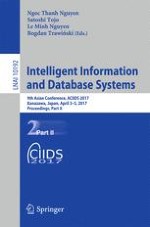2017 | OriginalPaper | Buchkapitel
Describing Criteria for Selecting a Scrum Tool Using the Technology Acceptance Model
verfasst von : Gerard Wagenaar, Sietse Overbeek, Remko Helms
Erschienen in: Intelligent Information and Database Systems
Aktivieren Sie unsere intelligente Suche, um passende Fachinhalte oder Patente zu finden.
Wählen Sie Textabschnitte aus um mit Künstlicher Intelligenz passenden Patente zu finden. powered by
Markieren Sie Textabschnitte, um KI-gestützt weitere passende Inhalte zu finden. powered by
